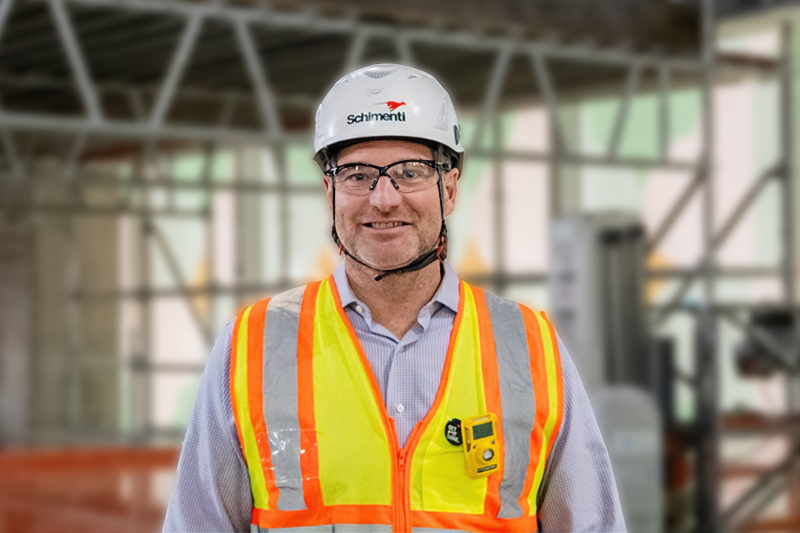Construction firms have always made it a priority to mitigate the dangers inherent to our work, but building a thriving culture of safety is easier said than done. It’s more than a leadership team putting safety protocols in place, but rather an environment that values every voice in the company. This week is the 10th anniversary of Construction Safety Week and is a time to celebrate our efforts and recommit to the high safety standards we strive for as an industry. Three pillars are needed to up a strong safety culture that values every voice: taking personal ownership, fostering new ideas, and listening. Done right, a culture of safety can do much more than reduce job site accidents. It can also improve efficiency, team morale, recruiting efforts, and, ultimately, the bottom line.
Driving Personal Ownership
The first pillar of a strong safety culture is driving personal ownership and building a strong team of confident, accountable individuals. While it’s important that your workforce is properly trained, following protocols, and effectively completing jobs, there also needs to be open, honest communication about safety. Here at Schimenti, we are committed to the idea of “Think safe. Work safe. Live safe.”
Establishing this credo allows us to communicate our values and principles around safety. This language empowers each employee, not just at the job site but through everything we do as the company, whether with executives, project managers, or support services like human resources, marketing, and finance. When every employee in the company is clear that safety comes first, all decisions and actions are expected to meet safety standards, with no exceptions.
This clear set of values ensures that everyone in the organization feels personal ownership around safety, putting all employees on an equal level as they strive to meet our high safety standards. This creates less hierarchy, and the organization gets flatter by nature, meaning messages are less likely to get lost in translation. It also fosters an engaging, supportive environment that promotes communication, ownership, and teamwork, where everyone can express their ideas, needs, and concerns without fear of judgment or repercussion. As a result, an employee on a job site should be able to talk to the company president as easily as talking to a group of peers.
Providing opportunities for personal development also drives personal ownership. Offering a variety of company-sponsored programs is important, along with encouraging industry involvement. For example, we support employees’ involvement in industry associations such as Associated Builders and Contractors or the Associated General Contractors of America, both nationally and locally. These organizations offer great resources about new practices for reducing hazards and injuries and opportunities to attend monthly committee meetings. It also inspires and informs new ideas and solutions that can be brought back and shared with colleagues at your company.
Driving personal ownership comes down to consistent and open communication. When there is clear, consistent messaging about safety, whether in training, documentation, or processes, consistency helps empower everyone.
Encourage and Welcome New Ideas
The second pillar of a strong safety culture is built around new ideas. Great ideas can come from the most unlikely places at the most unlikely of times. When employees know they can safely share ideas, and their voices are valued, they are more likely to share those ideas that could help make a job site work more safely and efficiently.
Safety program development benefits from being open to input from anyone in the company. It brings fresh perspectives on ways to improve everything from on-site conditions to daily operations to safety processes and practices. The worker remains the most untapped resource as they are the tip of the spear and generally the closest to the answer. On many occasions, through talking to workers or merely watching what they do, I have been like, “Why didn’t I think of that.”
Creating more formal settings for idea sharing can also be the catalyst for solving problems. At Schimenti, we have a monthly safety committee comprised of field workers that provides a perspective on safety from which management is far removed. It’s also been beneficial for us to nurture long-standing relationships with industry-leading subcontractors and find ways to bring their expertise into these meetings.
It’s important to reward employees for sharing new ideas. Too often, the focus is on shortcomings or noncompliance, and the overwhelmingly positive actions of industry employees go unrecognized. Rewarding workers not only encourages employees to share but also contributes to a culture where personal ownership is acknowledged and encouraged. Rewards can happen through formal programs like token incentive programs or monthly awards. However, informal programs are important, too. It can build team camaraderie when using things like on-the-spot, “fly by” recognition, or spontaneous, personal thank-you notes. The idea that you have to give away televisions or a truck to get people interested is a stereotypical concept. Most of our trades are professionals who make a good wage and are not looking to be coerced into doing the right thing. A sincere thank you, or compliment goes a long way. At Schimenti, we expect our team to treat each other as if they had just done work on each other’s homes. These job sites are, in fact, their home away from home, so let’s treat it with the same respect.
Companies that are more inclusive with ideation around safety planning, programming, and practices are rewarded with greater trust, respect, unity, and understanding within teams.
Embrace Every Voice
The third pillar of a strong safety culture is really about listening. Clear communication in the construction industry is not just beneficial but imperative to ensure a culture of safety. Because there are so many elements at play on a construction job, making sure everything comes together smoothly and safely, every voice needs to be heard. Emphasizing the importance of listening and accepting what’s communicated in the workplace can strengthen trust and respect within teams.
It’s also important to remember that vendors, trade partners, and clients are part of your safety culture and deserve the opportunity to be heard. It comes down to creating an environment where everyone involved with your company is valued, engaged, and motivated.
Embracing every voice doesn’t mean agreeing with everyone. It doesn’t even mean that there needs to be an immediate response or solution offered. It does mean that you respect and care about the individual speaking, and when it comes to a strong culture of safety, nothing is more important than making sure every team member in every role feels seen, heard, understood, and supported.
Having grown up in this industry — my father was a union carpenter, and I worked in the trades — I’ve learned to greatly respect those who have made it their career. More than in other lines of work, in construction, you spend a lot of time with a tight-knit group of people who do things that are unconceivable to an outsider looking in. This dynamic creates very close relationships as the interdependence of those around you makes everyone successful. With the inherently dangerous work that needs to get done, a level of trust is formed amongst those who work together. You spend long days together, eat together, and often ride to and from work together. Although I am not on the job site day-to-day, as Safety Director, I get the satisfaction of representing the workers and really valuing every voice.
Measuring Success
When every voice is valued at a company, the culture is strengthened, and good results follow. The impact of a strong culture of safety can be measured both quantitatively and also qualitatively. Of course, reducing job site accidents, lowering EMR, and improving overall profitability are essential success factors to measure. However, other factors can show success, too. For example, is your workforce happy and satisfied at work? Happy workers mean productive workers, which increases productivity and loyalty. That, in turn, becomes a strong recruiting tool as other workers want to work with happy, successful people.
In the construction industry, we all go to work to support our families, but we also need to go home to them, and having a culture of safety allows this to happen. This foundational idea is integral to our core value system at Schimenti and is essential to how we think, plan, and act, from the executive offices to the job site. It’s at the core of everything, and everyone in the company conducts themselves with this idea in mind. A strong culture of safety elevates each individual’s contributions to the collective success and makes safety the entire team’s responsibility.
About the Author
Matthew Gerstung, Director of Corporate Safety at Schimenti, leads the company’s safety team, enforcing industry-wide safety standards and policies to ensure the well-being of all workers onsite. Before joining Schimenti, Matthew served as the Business Unit Safety Manager at Gilbane, where he played a central role in enhancing safety protocols and ensuring compliance with various regulatory bodies. Matthew holds notable certifications, including CSP (Certified Safety Professional), CHST (Construction Health and Safety Technician), CRIS (Construction Risk and Insurance Specialist), and LEED AP (Leadership in Energy and Environmental Design Accredited Professional).


